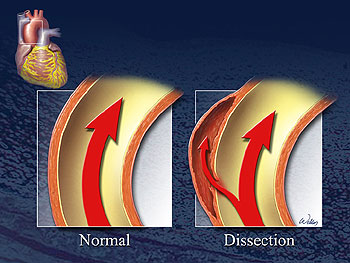Chest pain related to cardiac problems
In general, chest pain related to a heart attack or another heart problem is associated with one or more of the following:
- Pressure, fullness or tightness in your chest
- Crushing or searing pain that radiates to your back, neck, jaw, shoulders and arms, especially your left arm
- Pain that lasts more than a few minutes, goes away and comes back or varies in intensity
- Shortness of breath, sweating, dizziness or nausea
If your coronary arteries are unable to do their job properly because of blockages or other causes, you may experience chest pain known as angina pectoris. In severe cases, where the blood supply to the heart muscle is significantly disrupted, a heart attack may occur.
If you are concerned about your heart, you should try this questionnaire for the Prediction of Coronary Artery Disease (CAD).
Heart Disease is the number one cause of death in the U.S. for both men and women. The symptoms of the various kinds of heart disease depend on the seriousness of the problem. Silent Ischemia refers to a form of heart disease with mild or unnoticeable symptoms.
Angina is a type of heart-related chest pain. This pain occurs when your heart is not getting enough blood and oxygen. The most common symptom is chest pain that occurs behind the breast bone or slightly to the left of it. It may feel like tightness, heavy pressure, squeezing, or crushing pain. The pain may spread to the arm, shoulder, jaw, or back.

Angina Pectoris is a sensation of tightness or pressure in the chest area that is experienced during periods of physical exertion or emotional stress. The pain may cease when the exertion stops or the distress is relieved. If it does not, then it should be seen as an indication of more serious heart disease and the increased risk of heart attack. The pain of a heart attack lasts longer than that of Angina, though it may be less severe. It is often described as a “crushing” pain in the center of the chest. The pain may also spread to the neck, shoulders, or arms and be associated with perspiration, a feeling of dizziness or lightheadedness, and shortness of breath.
Chest pain that persists for more than a few minutes or that recurs frequently should be taken seriously as a potential sign of a Myocardial Infarction (heart attack):


In all, a heart attack may last for hours, during which the heart sustains progressive damage. However, only about 10-15% of patients who enter hospitals in the U.S. complaining of chest pain turn out to have a form of heart disease.
-
 Pericarditis
Pericarditis
A condition in which the sac-like covering around the heart (pericardium) becomes inflamed. Chest pain is one of the common symptoms of acute pericarditis. It is usually of sudden onset, occurring in the anterior chest and may be pleuritic in nature — that is, sharp and worsens with inspiration, due to concomitant pleural inflammation. The pain may be alleviated with sitting up and leaning forward while worsened with lying down.
Patients with aortic stenosis may develop chest pains that are associated with other symptoms such as fatigue, palpitations and shortness of breath.
Most patients with aortic dissection present with severe sudden pain, described as tearing, stabbing or sharp in character. While the pain may be confused with the pain of a myocardial infarction (heart attack), aortic dissection is usually not associated with the other signs that suggest myocardial infarction, including heart failure, and EKG changes. Less common symptoms that may be seen in the setting of aortic dissection include congestive heart failure, paralysis, or even cardiac arrest and sudden death.


